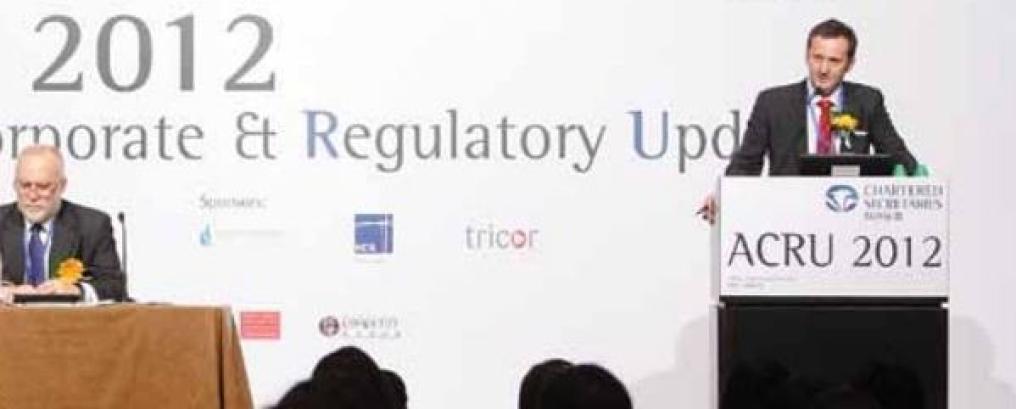Much effort has gone into ensuring that companies have channels for whistleblowers to report corporate misdemeanours, but what do you do when you receive a whistleblower tip-off? Colum Bancroft, Managing Director, Kroll Advisory Solutions, indicates some of the things to look out for when assessing the credibility and seriousness of whistleblower allegations in China.
F raud and corruption are ongoing concerns in China. According to Kroll's 2011/ 2012 Global Fraud Report, 84% of companies in China noted they were a victim of fraud, the second highest proportion of companies of any country or region measured in the report. The most common malpractices identified were procurement fraud, information theft and management conflict of interest.
Fraud schemes in China are considerably more complex today than in previous years and often involve collusion among internal employees across departments or with external parties. A single perpetrator will usually not be able to take their corrupt or fraudulent act far without including others in their scheme. They may also be motivated, perhaps simply by greed, to recruit like-minded people in order to increase their potential financial reward, although the more people involved, the greater the chance that the scheme will be discovered. Often the whistle is blown by one of the accomplices who is no longer happy with the financial reward that he or she is receiving.
According to the Association of Certified Fraud Examiners, 40.2% of occupational frauds are detected by a tip-off, of which employees are the most common source. However, time and time again we come across situations where management is unsure of how to deal with a whistleblower allegation and often makes the mistake of ignoring it altogether. Knowing how to read between the lines is key when evaluating whether an allegation is genuine or not. While some allegations come from disgruntled or malicious employees and can be dealt with quickly, others highlighting alarming concerns may require further investigation.
Points to consider when reviewing a whistleblower allegation
When an anonymous whistleblower allegation is received, the designated individuals should consider the nature and severity of the allegations that are being made, as well as the seniority of the employee against whom the allegations have been made. The possible identity of the whistleblowers – whether they are inside or outside the company, or from which department within the company if the former – and what their ulterior motives, if any, may be, are other factors that need to be taken into account in assessing the likely validity of the allegations.
The investigative approach should be shared on a strictly need-to-know basis with others in the organisation. The investigation may start by comparing the purported facts stated in the whistleblower letter with facts from other sources, such as the company's existing books and records and discreet enquiries with appropriate staff members. If information gathered from these sources corroborates the information in the whistleblower allegation, further steps will need to be considered in order to verify the allegation and identify the possible impact on the company or its stakeholders. If the allegation appears to be refuted by the information gathered from these other sources, allegations received in the future should be closely monitored and reviewed for indications of the same issues.
The approach to reviewing an allegation can vary from country to country. Management should consider cultural influences in order to understand the context of the allegations, as well as the possible motivations of the whistleblower.
As elsewhere, whistleblowing, frequently by email, can come from any part of the company – from factory workers to senior level managers. However, in China, a few considerations stand out when trying to identify the whistleblower in order to understand the motives behind the accusation:
- The Chinese characters in the message may contain clues to identify the whistleblower. For example, how Chinese names are spelt can indicate that the individual speaks Cantonese or Putonghua, or is a native of mainland China, Taiwan or Hong Kong.
- Chinese whistleblowers may also attempt to disguise their identity in a number of ways, for example by sending emails written from an outsider's perspective when they are really an employee of the company; or by sending multiple letters or emails from different locations or addresses, with some differences in the specifics of certain allegations and/ or new allegations inserted. Close examination of the writing style and content in both cases, and analysis of the common features in the second example, can assist in narrowing down the source of the whistleblower.
- Although less common than emails, letters sent by post might show the sender's location on the postmark, so the information on the envelope should be analysed.
- Whistleblowers also rarely keep to a single accusation, often damning the subject of their messages with a list of charges. For instance, a whistleblower may typically make allegations about everything from biased company suppliers to the treatment of girlfriends and colleagues by the person accused. Both the nature of the individual accusations, and their likely source, will impact the investigative work that may be required. For example if the accusations are mainly commercially-based, covering issues such as potential kickbacks being received by the procurement department but also includes some personal accusations, such as the alleged infidelity of the procurement manager, the latter accusation may help to understand the likely identity of the whistleblower without detracting from the possible validity of the former accusation. The additional information may also assist the investigation by identifying an additional party (that is the mistress) who may be implicated in the scheme.
When interviewing employees and the whistleblower, management need to pin down people for details and look for signs that something is being held back. Whilst interviewees can be specific if they wish, where they seek to avoid a question – or if they are embarrassed about not knowing – they may use vague language. Such interview characteristics may point to specific areas which need to be further investigated.
Companies need to have policies and procedures in place when it comes to reviewing whistleblower allegations, and need to effectively evaluate the credibility and seriousness of the claims. If the tip-off lacks credibility, it can be dealt with internally. If the allegation is serious, it may require a full independent investigation.
Don’t ignore the allegation
Most overseas regulatory bodies encourage individuals to alert the authorities about violations of federal securities and/ or anti-bribery laws. Some, such as the Securities and Exchange Commission (SEC), in conjunction with the US Department of Justice under the recently-enacted Dodd-Frank whistleblower provisions, offers monetary rewards to whistleblowers whose tipoffs lead to successful prosecutions or settlements. If a company decides to dismiss a tip-off without investigating it, the whistleblower may go straight to the regulatory bodies, which could lead to a harsh penalty for the company if the allegation turns out to be correct. Additionally, if whistleblowers believe they have not been heard, they may try other avenues such as blogs and the media to expose their insight. In short, if an allegation is not dealt with quickly and appropriately, the tip-off could cause serious harm to a company's reputation.
Steps can be taken from the outset to shed light on the accused fraudster mentioned in the whistleblower allegation without drawing attention to the matter. Where lawful to do so, a review of company emails and internet browsing history will shed significant light on an insider's activities and associations. In cases involving suspected kickbacks or conflicts of interest, a review of sales or purchasing records may reveal anomalous patterns or suspicious trends indicative of corruption. Where possible, a review of corporate filings might show an employee's ownership interest in one or more vendors, whose share of purchase orders has been increased by the insider.
Amid the high number of whistleblower reports that companies in China are receiving every day, management should treat every reported allegation seriously, take appropriate steps to validate which allegations seem to be genuine and implement robust response strategies in dealing with the allegations. Where appropriate, engaging external consultants for specific advice or to carry out a credible independent investigation should be considered.
Colum Bancroft, Managing Director
Kroll Advisory Solutions
SIDEBAR: Case study
A case of an apparently minor allegation made by an anonymous tipster was a red flag for a much wider and more serious issue.
An anonymous tip was received by the management of a multinational company operating in China, claiming that one of the regional offices of the company was fabricating revenue figures. While an initial review of documents by the company's internal audit team did not reveal any irregularities and the transactions seemed to be substantiated by proper documentation, management requested an independent investigation to validate the allegation.
The investigation involved a thorough review of the regional office's sales contracts, sales orders, commission payments, rebates and receipt records. Interviews with the sales and customer service teams were also conducted. The review identified that some of the sales recorded in the accounting ledgers could not be vouched to genuine supporting documents. The sales contracts were found to be fictitious, with discrepancies noted between the regional office's copies and the copies provided to the company's headquarters. As a result, the investigation was expanded to review documents kept in other regional offices and compare the same with the headquarters’ records. It was found that a large proportion of the contracts were not legitimate. The company was eventually ordered by the SEC to restate its revenue for the past three years due to unreliable reported financial performance.
Furthermore, there were initially no concerns over corruption and bribery between the company's sales team and its customers. A basic review, by the client, of its documentation also did not find any inappropriate activities in this respect. However, the expanded investigation included conducting background searches on some of the company's employees and third-party consultants used in the selling process. The extended research and analysis identified that third-party intermediaries had been used to channel funds and rebates to certain entities. Working alongside the company's external counsel, the identified violations of the Foreign Corrupt Practices Act resulted in significant financial exposure for the company.
為確保檢舉者可以通過有效渠道對企業內的不法行為進行 檢舉,很多企業已做了很大努力。但當你收到檢舉人的 密告時又該如何處理呢? Colum Bancroft Kroll Advisory Solutions 的執行董事,就中國企業該如何評估指控的可 信性和嚴重程度提出了幾點建議。
欺詐和腐敗行為是讓中國企業持續 擔憂的嚴重問題。根據Kroll公司的 《2011/2012全球反欺詐報告》,84%的 中國企業承認曾遭受過欺詐行為的侵害, 這一比例是全球所有國家或地區中的第二 高。發生率最高的欺詐行為包括採購欺 詐、信息盜竊,以及管理層利益衝突。
與前幾年的情況相比,當今中國企業內 所發生的欺詐案更為複雜,常涉及不同 部門員工或內部員工與外部人員的串通 作案,可能因為單個作案人通常無法使 其腐敗或欺詐陰謀得逞。此外,出於貪 婪,作案人為獲得更多的不法收入,也 可能有勾結同夥作案的動機。但參與犯 案的人數越多,被發現的幾率也越大。 在很多情況下,因不滿分贓不均,某一 參與犯案的人員就會進行檢舉。
根據註冊反欺詐審查師協會發布的數據, 40.2% 的企業欺詐案是通過檢舉密告而 被發現的,其中來自員工的檢舉所占比例 最高。但是我們經常發現企業管理層並不 知道該如何適當地處理檢舉人所提出的指 控,而且經常犯下完全忽略這些指控的 錯誤。瞭解如何解讀檢舉信的言外之意, 這是判定指控是否屬實的關鍵。儘管一些 指控可能是心懷不滿的員工惡意捏造的, 但另外一些足以引起管理層警覺的指控則 可能需要進一步的調查。
審查檢舉指控時需考慮的要點
在收到匿名檢舉信後,負責處理的團隊或人員應評估檢舉指控的性質和嚴重程 度,以及被指控的員工在企業中的職位 和級別。此外,推想檢舉人的身份—— 企業內部的員工(以及是哪一個部門的 員工)或是外部人員——以及檢舉人提 出指控的隱秘動機也是在評估指控有多 大可信度時需要考慮的因素。
根據指控所進行的調查應僅限於讓企業 內必要知情的人員知曉。調查可先將檢 舉信中所指稱的事實與從其他來源(如 企業的帳簿和記錄、對相關員工的審慎 問詢等)所瞭解到的事實加以比較。如 果從這些來源所收集到的信息證實了檢 舉信中所指稱的事實,則需要採取進一 步的行動,以核實檢舉指控,並確定其 對企業或利益相關方的潛在影響。如果 檢舉指控已被這些從其他來源所收集到 的信息所否證,則應當對以後所收到的 針對同一問題的檢舉指控進行密切的監 測和審查。
在不同的國家,對檢舉指控進行審查的 方式各有不同。為了瞭解做出檢舉指控 的背景以及檢舉人可能的動機,企業管 理層必須考慮文化因素的影響。
與其他國家的情況一樣,中國企業所收 到的檢舉信(通常以電子郵件發出)可 來自任何內部員工——從工廠工人到高 級管理人員。不過對中國企業來說,在 試圖辨認檢舉人的身份從而瞭解其提出 檢舉指控的動機時,以下幾點需要特別 注意:
- 檢舉信息中的中文字可能包含發現 檢舉人身份的線索。例如,檢舉信 中中文姓名是如何拼寫的就可能表 明檢舉人是說廣東話還是普通話, 是土生土長的中國大陸居民,或是 來自臺灣或香港的居民。
- 中國的檢舉人還可能使用多種方式 試圖掩蓋其身份。例如,企業內部 員工以外部人員視角撰寫檢舉信並 以電子郵件發出,或從不同的地址或郵箱發出多份檢舉信或電子郵 件,其中包含一些不同的檢舉指控 內容和/或新的檢舉指控。在這兩種 情況下,對檢舉信的寫作風格和內 容進行細查,及在後一種情況下對 多份檢舉信的共同特點進行分析, 均有助於縮小檢舉人的範圍。
- 儘管與電子郵件相比並不那麼常見, 但在通過郵局發出的檢舉信上所蓋的 郵戳,也可能指出發信人的發信地 點,因此,應當對信封上的信息進行 分析。
- 檢舉人通常很少僅提出一項檢舉指 控,而是會混雜地提出多項指控。 例如,檢舉人通常會指控被檢舉人 的一系列不端行為,從偏袒供應商到對女性友人和同事的不當對待。檢 舉指控的性質及其可能的來源,均對 可能需要進行的調查產生影響。例 如,如果所指控的行為主要涉及商業 交易,如採購部收取回扣等,但同時 也包括一些關於個人行為的指控,如 採購經理對家庭不忠等,那麼後一指 控可能有助於查明檢舉人的可能身 份,且不影響前一指控的真實性。這 些額外的檢舉信息還可能有助於調查 人發現參與不法行為的其他方(如採 購經理的情婦)。
在與員工和檢舉人面談時,管理層需要 了解細節信息,並尋求是否有事項被隱 瞞的跡象。儘管接受詢問的人若願意可 以將所知資訊全盤托出,但如果他們希 望回避一些問題,或不願承認是否知情,則可能會使用含糊的言辭。這種情況 可需要深入調查來瞭解隱藏的資訊。
在審查檢舉人所提出的指控時,企業需要 制定相關的公司政策和規程,並有效地評 估檢舉指控的可信性和嚴重程度。如果檢 舉缺乏可信性,在企業內部處理即可。但 如果所檢舉的事項屬嚴重違法行為,則可 能需要進行全面的獨立調查。
不能忽視檢舉指控
絕大多數海外監管機構都鼓勵個人檢舉違 反聯邦證券法和/或反賄賂法的行為。一些監管機構,如美國的證券交易委員會, 連同美國司法部,根據最近頒佈的《多 德-弗蘭克法》中的檢舉規定向檢舉人 授予獎金;這些舉報信息對案件起訴或達 成和解起到關鍵作用。如果一家企業在收 到檢舉後置之不理且不進行調查,那麼檢 舉人則可能直接向監管機構舉報,若檢舉 指控被證明屬實,該企業可能會遭受嚴厲 處罰。此外,如果檢舉人認為他們所提出 的指控被忽視,則可能轉而使用其他渠道 如博客和媒體等將之公諸於眾。簡言之, 如果一家企業未及時和適當地處理檢舉指 控,其聲譽可能受到嚴重損害。
企業應該從一開始就可採取行動,在 不驚動檢舉信中所指稱的嫌疑者的情 況下開展調查。對公司電子郵件和互 聯網流覽歷史記錄進行合法的審查, 將為查明內部人員的行為和其外部聯 繫提供重要線索。如果是對涉嫌收受 回扣或利益衝突案的調查,對銷售或 採購記錄的審查可揭示出異常的模式 或隱蔽貪污的可疑動向。對企業登記 文件的審查,則可顯示公司內部員工在 一家或多家供應商中擁有的股權,反 映該員工是否為這些供應商從公司謀 取了更多數量的採購訂單。
中國企業的管理層應當認真對待每一宗 收到的檢舉報告,採取適當的行動核實 檢舉內容是否屬實,並採用強有力的應 對策略予以處理。如有需要,應當考慮 聘請外部咨詢師提供具體建議,或進行 可信的獨立調查。
Colum Bancroft
Kroll Advisory Solutions 執行董事
SIDEBAR: 案例研究
匿名檢舉信中所提出的輕微指控可能是一個牽涉面 甚廣且更為嚴重的問題的危險信號。
一家在華跨國公司的管理層收到了一封匿名檢舉 信,指控該公司的一地區辦事處偽造營業收入數 字。儘管該公司的內部審計團隊對相關文件的初步 審查顯示並無任何會計舞弊行為,相關交易表面上 看來都有合適的文件作為憑證,但為了核實指控是 否屬實,管理層決定聘請獨立調查機構進行調查。
調查涉及對該地區辦事處的銷售合同、銷售訂單、 佣金支付、回扣和收據記錄進行全面徹底的審查, 此外還進行了與銷售和客服團隊成員的面談。所進 行的審查發現,一些在會計賬簿上記錄的銷售交易 並沒有真實的證明文件作為憑證。一些銷售合同被 證實是虛假的,在該地區辦事處保存的合同文本與 提交給公司總部的合同文本間有巨大差異。因此, 調查範圍擴大到對其他地區辦事處保存的合同文件 與提交給公司總部的同一文件進行對比。調查發 現,很大一部分合同都是不合法的。由於所報告的 財務業績不實,該公司最終被美國證券交易委員會 責令重報過去三年的營業收入。
此外,最初該公司並未關注公司銷售團隊和客戶之 間存在的賄賂等腐敗行為,對公司相關文件所進行 的基本審查也未發現任何不法行為。但是在調查範 圍擴大到對公司一些員工及銷售過程中所聘用的第 三方諮詢師的背景進行調查之後,調研和分析結果 顯示第三方中介機構被用於向一些實體轉移資金和 支付回扣。通過與該公司外部法律顧問合作,獨立 調查機構證實,所查明的違反《反海外腐敗法》的 行為已導致該公司蒙受重大財務風險。



